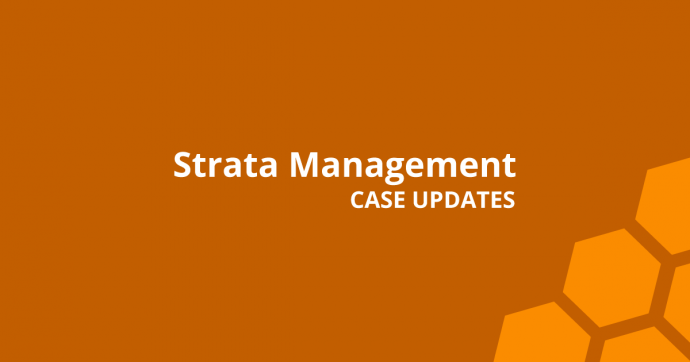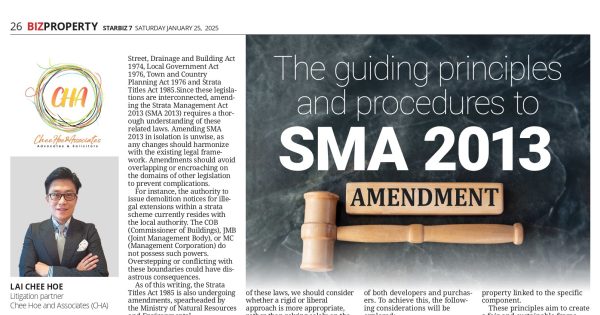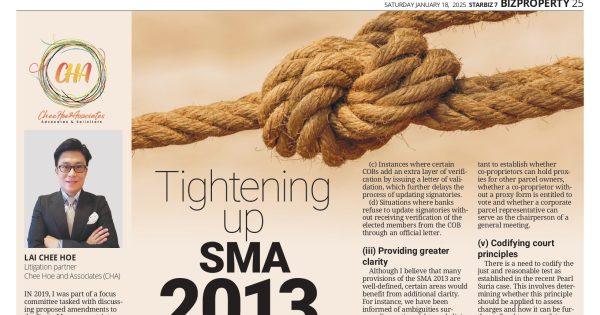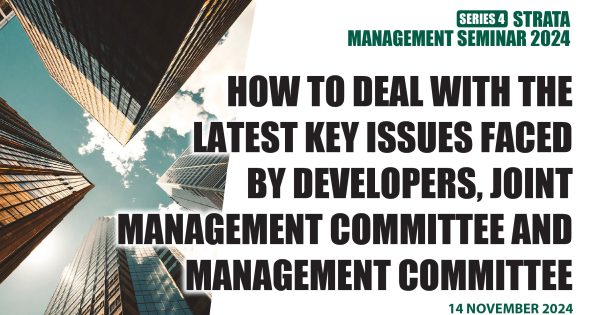
- WA-22NCVC-301-06/2020 Asmaziah Binti Abu Bakar v Prema Bonanza Sdn Bhd (High Court)
2. WA-22NCVC-303-06/2020 Foong Chee Tek and another v Prema Bonanza Sdn Bhd (High Court)
3. WA-22NCVC-305-06/2020 Obata-Ambak Holdings Sdn Bhd v Prema Bonanza Sdn Bhd (High Court)
4. WA-22NCVC-507-08/2020 Vignesh Naidu A/L Kuppusamy Naidu v Prema Bonanza Sdn Bhd (High Court)
5. WA-B52NCVC-76-02/2020 Avantgarde Arena Sdn Bhd v Prema Bonanza Sdn Bhd (Sessions Court)
6. WA-A52NCVC-192-02/2020 Chang Hing Kiang v Prema Bonanza Sdn Bhd (Sessions Court)
7. WA-B52NCVC-51-02/2020 Michael Enroll Hyde v Prema Bonanza Sdn Bhd (Sessions Court)
*(update on 16.6.2021) case no. 5,6 and 7 (striking out and summary judgment) were appealed against in the High Court (by the parcel owner) . On 11.6.2021, YA Dato Sri Latifah dismissed all 3 appeals.
FACTS:
All the Plaintiffs above are purchasers to a housing project and signed off a prescribed Schedule H Sale and Purchase Agreement (“SPA”) on or around year 2012-2013. The SPA sets out clearly that the completion period is 54 months. EOT was obtained prior to SPA signed. Vacant possession was delivered to all the parcels.
Post Ang Ming Lee’s Federal Court’s decision delivered on 26.11.2019, purchasers filed multiple suits (through a writ and statement of claim) against the developer Prema Bonanza Sdn Bhd. Their core argument relies heavily if not solely on the fact that any form of extension of time (“EOT”) given by the Housing Controller is ultra vires and has no effect. As a result of which, vacant possession ought to be delivered within the 36 month period and not 54 months. Liquidated Ascertained Damages (“LAD”) should start to run from 36th month onwards.
Plaintiffs filed summary judgment to claim for LAD (for the gap between 36-54 months) and the Defendant filed striking out applications in all 7 cases.
In cases 1,2 and 3, the Defendant filed an O14A application (to dispose off the matter based on points of law).
Cases:
(a)1, 2 and 3 were heard by High Court Judge YA Datuk Seri Mohd Firuz Bin Jaffril (grounds of Judgement can be downloaded below)
(b) 4 was heard by High Court Judge YA Dato Rozana Binti Ali Yusoff (grounds of judgment can be downloaded below)
(c) 5 and 6 were heard by Sessions Court Judge Puan Idah Binti Ismail
(d) 7 was heard by Sessions Court Judge Tuan Shamsudin Bin Abdullah
(e) appeals of 5,6,7 were heard by YA Dato Sri Laitfah
Decision:
All the 7 cases above were struck out and summary judgment applications were disallowed. Reasons given by the Judges vary but it is worth noting that there are common points found by the Judges (especially in the oral decision given by Datuk Seri Mohd Firuz when answering to the questions of law posed in the O14A application.) The common grounds found by the Judges can be summarised as follows:
- Limitation period has set in. Cause of action accrues on the date of the SPA and not when vacant possession was delivered. Time starts to run on the date of SPA;
- Writ is a wrong mode. The correct mode to initiate an action (when core issue is to challenge the EOT) ought to be begun by a Judicial Review and not a Writ. Filing a Writ seeks to circumvent the strict timeline stipulated in Order 53 r3 (6) Rules of Court 2012 where an aggrieved party should make an application for judicial review within 3 months from the date when the grounds of application first arose.
Other supplementary issues eg: estoppel, unjust enrichment are dealt with in passing and they were ruled in favour of the Developer. The development of English Jurisprudence on Prospective Overruling was however not adopted by the Judges.
Grounds of Decision for cases 5, 6 and 7 are available in LexScout and cases 1-4 are not available as yet.
At the time of writing, cases 4, 5, 6 and 7 are being appealed against and cases 1,2,3 will very likely be sharing a similar fate.

Different Views taken by other Judges
On the other hand, 2 High Court Judges (YA Datin Rohani Binti Ismail for cases 300, 302, 304 and JC Quah Chew Soon for cases 418 and 460 ) took a different approach (in cases below) and granted summary judgment in favour of the purchasers (based on similar facts above):
(a) WA-22NCVC-300-06/2020; (Galeri Bersatu Sdn Bhd v Prema Bonanza Sdn Bhd)
(b) WA-22NCVC-302-06/2020 (Ee Ching Ching and others v Prema Bonanza Sdn Bhd)
(c) WA-22NCVC-304-06/2020 (How Hoe Lian and other v Prema Bonanza Sdn Bhd)
(d) WA-22NCVC-418-07/2020 (Lam Su See v Prema Bonanza Sdn Bhd)
(e)WA-22NCVC-460-08/2020 (Leong Keng Chiang v Prema Bonanza Sdn Bhd)
Both Judges opined that the Federal Court’s decision in Ang Ming Lee applies (regardless when EOT was obtained) and they are bound by the stare decisis principle. Since the Housing Controller has no powers to grant EOT, the prescribed SPA cannot be amended and the completion period remains within the 36 month period. The Purchasers in those cases were awarded LAD from 36 months onwards.
Takeaway:
Both decisions in Ang Ming Lee and Alvin Leong (in ruling that Ang Ming Lee has retrospective effects) create disruptive consequences to Developers. The number of suits filed (against Developers) post Ang Ming Lee is increasing across the board. When an award is given in favour of a purchaser, it is an unexpected windfall gain.
It will be interesting to see how the appellate courts will apply equity principles and adopt the judicial tool of “prospective overruling” to serve the underlying objective of the courts to administer justice fairly. This is especially when there is a full extent of reliance on the law by Developers (as to the validity of EOT) when signing SPAs with purchasers. See: PP v Hue An Li [2014] 4 SLR. In this case, the High Court of Singapore analyzed the “prospective overruling” principle within a framework to guide the court in exercising its discretion:
This discretion is to be guided by the following factors:
(a) The extent to which the law or legal principle concerned is entrenched: The more entrenched a law or legal principle is, the greater the need for any overruling of that law or legal principle to be prospective.
(b) The extent of the change to the law: The greater the change to the law, the greater the need for prospective overruling.
(c) The extent to which the change to the law is foreseeable: The less foreseeable the change to the law, the greater the need for prospective overruling.
(d) The extent of reliance on the law or legal principle concerned: The greater the reliance on the law or legal principle being overruled, the greater the need for prospective overruling.


